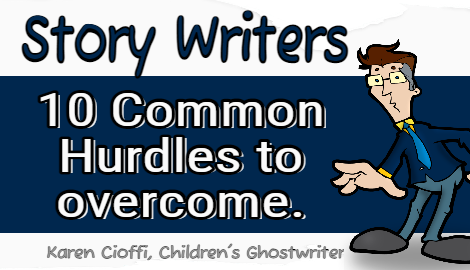Contributed by Suzanne Lieurance
New novelists often encounter a range of challenges (difficulties or hurdles to overcome) as they begin writing their book.
Here are 10 of the most common problems you may face if you’re a new novelist, PLUS what to do about each one:
Challenge #1. Writer's Block.
This is perhaps one of the most notorious obstacles.
It's when a writer finds themselves unable to produce new work or experiences a creative slowdown.
Try these strategies if you experience writer’s block:
° Take breaks and engage in activities that inspire creativity, such as reading, going for walks or listening to music.
° Try freewriting or brainstorming to generate new ideas without judgment.
° Set realistic writing goals and deadlines to maintain momentum.
Challenge #2. Lack of Direction.
Many new novelists struggle with not having a clear outline or plan for their story, leading to confusion and a lack of coherence in the plot.
If you lack direction in your novel, try these actions:
° Create a detailed outline or story structure before diving into writing.
° Develop character profiles and plot summaries to guide your writing process.
° Consider using writing prompts or exercises to explore different narrative possibilities.
Challenge #3. Character Development.
Creating compelling and believable characters can be difficult.
Writers may find it challenging to flesh out characters with depth, motivations, and unique personalities.
To develop your characters, try these strategies:
° Conduct character interviews to delve into their backgrounds, motivations, and goals.
° Allow characters to evolve naturally as you write, paying attention to how they respond to events and challenges.
° Give characters distinct voices, mannerisms, and flaws to make them memorable and relatable.
Challenge #4. Plot Holes and Inconsistencies.
Keeping track of plot details, timelines, and ensuring consistency throughout the narrative can be challenging for new writers.
Try these methods for avoiding plot holes and inconsistencies:
° Keep a story bible or timeline to track important plot details, character arcs, and world-building elements.
° Conduct regular revisions and edits to address inconsistencies and tighten the narrative.
° Seek feedback from beta readers or critique partners to identify areas where the plot may be unclear or inconsistent.
Challenge #5. Overwriting or Underwriting.
Finding the right balance between providing enough detail to engage readers without overwhelming them or leaving the story underdeveloped can be tricky.
To avoid overwriting or underwriting:
° Practice self-editing techniques to identify areas where you can trim unnecessary details or expand on important scenes.
° Strive for balance by focusing on essential descriptions and dialogue that move the story forward.
° Experiment with different writing styles and techniques to find your unique voice and rhythm.
Challenge #6. Fear of Criticism or Failure.
New writers may struggle with self-doubt and fear of judgment from others, which can hinder their creativity and confidence in their work When you fear criticism or failure:
° Remind yourself that all writers face rejection and criticism, and it's a natural part of the creative process.
° Surround yourself with supportive peers or mentors who can provide constructive feedback and encouragement.
° Focus on improving your craft and telling the story you want to tell, rather than worrying about others' opinions.
Challenge #7. Procrastination.
It's easy to put off writing tasks, especially when faced with challenges or uncertainties.
Overcoming procrastination is a common hurdle for many writers.
When you notice you are starting to procrastinate:
° Break down writing tasks into smaller, manageable steps to make them less daunting.
° Establish a consistent writing routine and set aside dedicated time for your creative work.
° Use productivity tools or techniques, such as the Pomodoro Technique, to stay focused and motivated.
Challenge #8. Revision and Editing Difficulties.
Knowing how to revise and edit effectively is a skill that takes time to develop.
New writers may struggle with self-editing or knowing when to seek external feedback.
Try these revising and editing strategies:
° Take a break between writing and revising to gain fresh perspective on your work.
° Utilize self-editing checklists or techniques, such as reading your work aloud or changing the font, to catch errors and improve clarity.
° Consider hiring a professional editor for a comprehensive critique and feedback.
Challenge #9. Finding Time to Write.
Balancing writing with other responsibilities and commitments can be tough.
Many new writers struggle to carve out dedicated time for their craft with their busy schedules.
These tips should help when you’re having trouble finding time to write:
° Prioritize writing by scheduling it into your daily or weekly routine.
° Identify and eliminate time-wasting activities or distractions that prevent you from writing.
° Set specific goals and deadlines to hold yourself accountable and track your progress.
Challenge #10. Finishing the Manuscript.
Starting a novel is one thing, but completing it is another challenge altogether.
Many new writers struggle to see their projects through to the end.
Try these tips to make sure you complete your novel:
° Break the writing process into smaller milestones and celebrate each accomplishment.
° Stay motivated by focusing on the sense of achievement and satisfaction you'll feel upon completing your manuscript.
° Consider participating in writing challenges or accountability groups to stay on track and connect with other writers who share similar goals.
Navigating these challenges often requires perseverance, patience, and a willingness to learn from mistakes.
Joining writing groups, seeking feedback from peers or mentors, and studying the craft of writing can all help you overcome these obstacles and grow as a novelist.
This article was previously published at:
https://www.writersonthemove.com/2024/03/10-common-challenges-many-new-novelists.html
ABOUT THE AUTHOR
For more writing tips and helpful resources, be sure to get your free subscription to The Morning Nudge and join our Law of Attraction for Writers Facebook group.
Suzanne Lieurance is an award-winning author, with over 40 published books, and a Law of Attraction coach for writers at writebythesea.com

I’m a working children’s ghostwriter, rewriter, editor, and coach. I can help turn your story into a book you’ll be proud to be the author of, one that’s publishable and marketable.
OTHER HELP I OFFER:
HOW TO WRITE A CHILDREN’S FICTION BOOK
A DIY book to help you write your own children’s book.
PICTURE BOOK, CHAPTER BOOK, MIDDLE GRADE COACHING
Four to ten-week coaching programs.
WRITERS ON THE MOVE SELF-PUBLISHING HELP.
Self-publishing help for children’s authors.
Creating An Author Online Platform
Step-by-step with a former WOW! Women on Writing author online platform instructor
You can contact me at: kcioffiventrice@gmail.com. Or give me a call at 347—834—6700. (Please leave a message- I’ll get back to you as soon as I can.)


